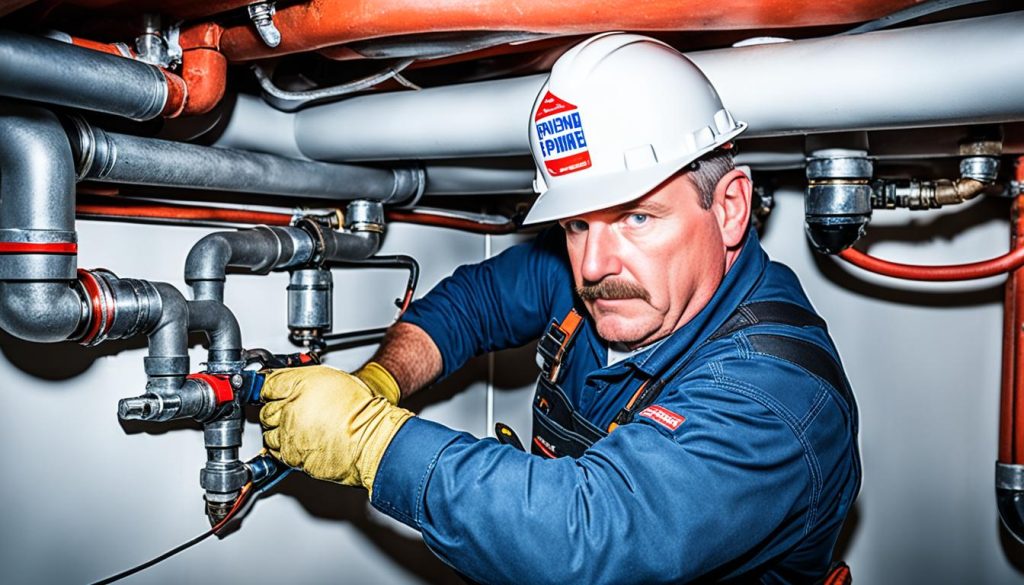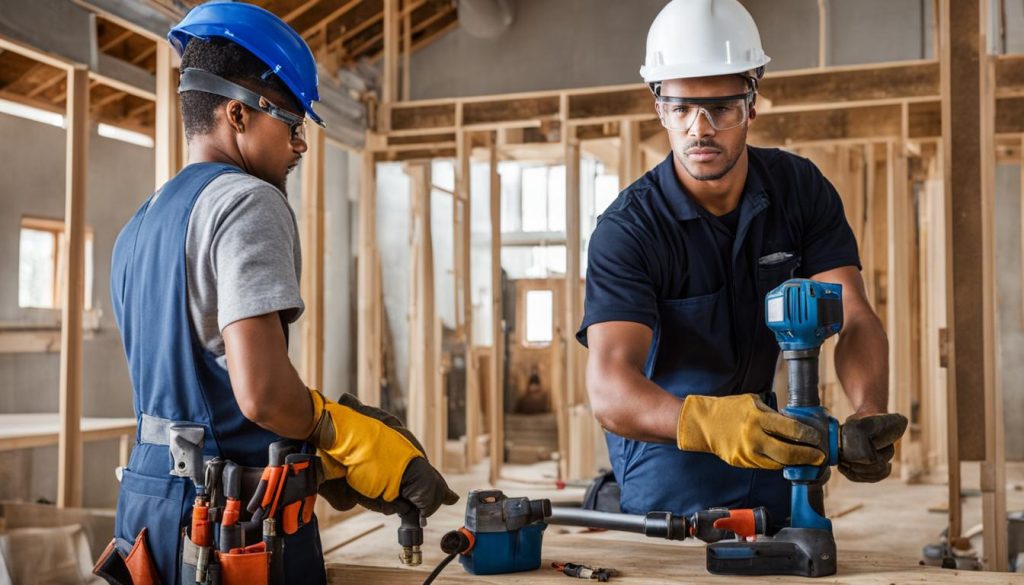Essentials for Becoming a Plumber | Skills & Tools Needed
If you’re considering a career as a plumber, you’re choosing a profession that offers a wide range of opportunities and job security. Plumbers play a crucial role in keeping our homes and businesses running smoothly, ensuring that we have clean water and functional plumbing systems.
Becoming a plumber requires a combination of technical skills, practical experience, and a dedication to staying updated with industry trends. In this article, I will guide you through the essential requirements and skills needed to succeed in the plumbing industry.
Whether you’re interested in pursuing a plumbing apprenticeship, obtaining plumber certification, or gaining the necessary plumbing skills, this article will provide you with valuable insights to help you kickstart your journey as a plumber.
Key Takeaways:
- Plumbing is a rapidly growing trade in Canada.
- Becoming a plumber requires a combination of technical skills and practical experience.
- Plumbing apprenticeships and certifications are typical paths to becoming a qualified plumber.
- Soft skills such as customer service and flexibility are also important for success in the plumbing industry.
- Staying informed about new plumbing trends and technology is essential for staying competitive.
Technical Plumbing Skills
As a plumber, having strong technical skills is essential for success in this field. These skills encompass various tasks, including installation, troubleshooting, and repair of pipes and plumbing systems. Additionally, the ability to read and comprehend blueprints is crucial to accurately understand and implement plumbing plans. Basic math skills are also necessary for estimating costs and performing calculations required for plumbing projects. Finally, proficiency in using hand and power tools is vital for completing plumbing tasks effectively and safely.
Being skilled in plumbing installation ensures that you can efficiently set up, connect, and assemble various water supply and drainage systems. Whether it’s installing new fixtures or connecting pipes, your expertise in this area enables you to create functional and leak-free plumbing systems.
Troubleshooting skills are essential for quickly identifying and resolving plumbing issues. From determining the cause of a leaking pipe to diagnosing a clogged drain, your ability to troubleshoot allows you to provide efficient and effective solutions to your clients.
Repairing damaged or malfunctioning plumbing systems is another crucial aspect of a plumber’s role. Your repair skills enable you to fix issues such as leaky faucets, burst pipes, or malfunctioning water heaters, ensuring that the plumbing systems of homes and businesses work optimally.
Blueprint comprehension is vital for understanding the layout and design of plumbing systems in construction projects. By interpreting blueprints accurately, you can ensure that the plumbing installation meets the required specifications and adheres to regulations.
Basic math skills play a significant role in everyday plumbing tasks, such as estimating project costs, measuring and cutting pipes to specific dimensions, and calculating water flow rates. Having a solid foundation in math equips you with the ability to perform these calculations accurately.
Finally, hand and power tool expertise is necessary for successfully executing plumbing tasks. From pipe wrenches to tubing cutters and plumber’s torches, being skilled in using these tools enables you to work efficiently and achieve high-quality results.
By developing and honing your technical plumbing skills, you will be well-prepared to tackle any plumbing project that comes your way.
| Technical Plumbing Skills | Description |
|---|---|
| Installation | Efficiently setting up and connecting water supply and drainage systems |
| Troubleshooting | Identifying and resolving plumbing issues |
| Repair | Fixing damaged or malfunctioning plumbing systems |
| Blueprint Comprehension | Reading and understanding plumbing system plans and specifications |
| Basic Math Skills | Performing calculations for cost estimates, measurements, and water flow rates |
| Hand and Power Tool Expertise | Proficiency in using plumbing tools to complete tasks |
Soft Plumbing Skills
While technical skills are crucial for success in the plumbing industry, there are also important soft skills that plumbers should possess. These skills, although less tangible, play a significant role in building a thriving career. Let’s explore the key soft plumbing skills that can make a difference:
Flexibility
As a plumber, flexibility is essential. Plumbing emergencies can happen at any time, and being available to work on weekends, holidays, and odd hours is crucial. By demonstrating flexibility, you can provide prompt and efficient service to your clients, positioning yourself as a reliable professional in the industry.
Customer Service
Providing excellent customer service is paramount for establishing a strong reputation and maintaining a loyal client base. Maintaining open communication, being attentive to customer needs, and resolving issues promptly are all part of delivering exceptional service. By prioritizing customer satisfaction, you can foster long-term relationships and gain referrals from satisfied customers.
Continued Education
Staying up-to-date with the latest trends and advancements in the plumbing industry is vital. Continuing education helps you enhance your skills, expand your knowledge, and remain competitive in a rapidly evolving field. By investing in your education, you can stay ahead of the curve and offer the best solutions to your clients.
Physical Fitness
The nature of plumbing work often involves physically demanding tasks. From carrying heavy equipment to navigating tight spaces, physical fitness is essential for performing the job efficiently and reducing the risk of injuries. Maintaining a healthy and fit lifestyle can contribute to your overall success as a plumber.
Collaborative Attitude
Plumbers often work alongside other tradespeople on construction sites or in renovation projects. Having a collaborative attitude is crucial for effective teamwork and project completion. By fostering positive working relationships and being open to collaboration, you can ensure smooth coordination and customer satisfaction.
To illustrate the importance of these soft plumbing skills, here’s a table summarizing their significance:
| Soft Skill | Importance |
|---|---|
| Flexibility | Enables prompt response to emergencies |
| Customer Service | Builds a strong reputation and loyal client base |
| Continued Education | Keeps up with industry trends and advancements |
| Physical Fitness | Aids in performing physically demanding tasks |
| Collaborative Attitude | Facilitates effective teamwork and project completion |
Remember, while technical skills are essential, it is the combination of both technical and soft plumbing skills that sets apart outstanding plumbers.
Plumbing Apprenticeship and Qualifications
Completing a plumbing apprenticeship is a valuable and common journey towards becoming a qualified plumber. This apprenticeship provides plumbers-in-training with the opportunity to gain hands-on experience and acquire essential skills under the guidance of experienced professionals. However, it is important to note that apprenticeships in the plumbing industry can be highly competitive.
In addition to completing an apprenticeship, aspiring plumbers can benefit from participating in a pre-apprenticeship program. These programs offer a comprehensive introduction to the field of plumbing and provide hands-on experience that can enhance your chances of securing an apprenticeship position. By joining a pre-apprenticeship program, you can develop the technical skills necessary for success in the plumbing industry, such as installation, repair, and troubleshooting.
Participating in a pre-apprenticeship program can give you a competitive edge in the job market. These programs often collaborate with local plumbing businesses, helping you connect with potential employers. Furthermore, pre-apprenticeship programs equip you with the knowledge and skills needed to excel in your apprenticeship and future career as a plumber.
The hands-on experience gained during pre-apprenticeship programs allows you to familiarize yourself with the tools and techniques used in the field, ensuring that you are well-prepared and confident when beginning your apprenticeship. Additionally, pre-apprenticeship programs typically provide fundamental training in plumbing theory and code regulations, further enhancing your qualifications as a plumber.
Benefits of a Plumbing Apprenticeship and Pre-Apprenticeship Program
- Gain practical, on-the-job experience
- Learn from experienced professionals in the plumbing industry
- Enhance technical skills, including installation, repair, and troubleshooting
- Develop a strong foundation in plumbing theory and code regulations
- Increase employability and opportunities for career advancement
By combining a plumbing apprenticeship with a pre-apprenticeship program, you can maximize your chances of succeeding in the plumbing industry. These programs provide the hands-on experience, technical knowledge, and qualifications necessary to establish yourself as a skilled and reputable plumber.
Tools for Plumbing Success
Having the right tools is essential for success in the plumbing industry. As a plumber, I rely on a variety of plumbing tools to efficiently and effectively complete my work. These tools can be categorized into essential hand tools, power tools, and software tools that assist with managing my business. Let me provide you with a breakdown of each category:
Essential Hand Tools
When it comes to plumbing, essential hand tools are indispensable. These tools enable me to handle various plumbing tasks with precision and ease. Some of the essential hand tools that every plumber should have in their toolbox include:
- Pipe wrenches
- Basin wrenches
- Adjustable wrenches
- Faucet keys
With these hand tools, I can confidently tackle pipe installations, repairs, and other plumbing jobs efficiently.
Power Tools
Power tools offer increased efficiency, speed, and accuracy in carrying out plumbing tasks. As a plumber, I rely on the following power tools to enhance my productivity:
- Hacksaws
- Tubing cutters
- Plumber’s torches
These power tools enable me to cut through pipes, remove damaged sections, and safely solder joints. Their precision and power make them invaluable for complex plumbing projects.
Software Tools
In addition to the physical tools, there are also software tools that aid in managing and operating a plumbing business. These software tools provide streamlined solutions for administrative tasks, marketing, and customer management. Some of the software tools that I rely on include:
- Call booking software
- Marketing tools
- Invoicing software
- Scheduling software
These software tools help me manage appointments, handle marketing campaigns, generate invoices, and efficiently schedule jobs, saving me time and effort while ensuring smooth business operations.
Having the right combination of plumbing tools, including essential hand tools, power tools, and software tools, empowers me to provide quality plumbing services to my clients and run a successful business.
Staying Informed and Adapting to New Technology
As a plumber, it is crucial to stay informed about the latest plumbing trends and advancements in technology. Keeping up with new plumbing trends allows you to offer the latest solutions to your customers and stay competitive in the industry. Additionally, adapting to new plumbing technology enhances your ability to provide efficient and reliable services.
One of the key areas of focus in plumbing technology is the development of smart fixtures. These fixtures, such as smart toilets, faucets, and showerheads, are designed to optimize water usage and improve overall functionality. By incorporating smart fixtures into your services, you can offer customers energy-efficient options that contribute to water conservation.
Another important aspect of staying informed is being knowledgeable about environmentally friendly plumbing systems. With increasing awareness of sustainability, more and more customers are seeking environmentally friendly solutions for their plumbing needs. This includes systems that reduce water waste, utilize renewable energy sources, and promote eco-friendly practices. By staying knowledgeable about these systems, you can cater to the needs of environmentally conscious customers and position yourself as a trusted expert in the field.
Benefits of Staying Knowledgeable about New Plumbing Technology:
- Ability to offer the latest solutions to customers
- Enhanced efficiency and reliability in providing services
- Opportunity to promote environmentally friendly practices
- Increased competitiveness in the plumbing industry
Continued education and keeping up-to-date with plumbing technology are essential for success in the field. By staying informed about new plumbing trends, incorporating smart fixtures, and offering environmentally friendly systems, you can provide valuable solutions to your customers and stay ahead of the curve.
| Plumbing Technology | Description |
|---|---|
| Smart Fixtures | Smart fixtures optimize water usage and improve functionality. Examples include smart toilets, faucets, and showerheads. |
| Water Conservation Systems | Systems designed to reduce water waste and promote sustainable water usage practices. |
| Eco-Friendly Plumbing | Plumbing systems that utilize renewable energy sources and promote eco-friendly practices. |
Importance of Safety and Code Compliance
Safety is of paramount importance in the plumbing industry. Plumbers must prioritize the well-being of both themselves and their clients by adhering to strict safety procedures and code compliance.
One critical aspect of ensuring safety is familiarity with the plumbing code. The plumbing code establishes the guidelines and standards for the design, installation, and repair of plumbing systems. By following the plumbing code, plumbers can ensure that their work meets the necessary safety and quality requirements.
Compliance with the plumbing code not only promotes safety but also helps prevent potential problems down the line. By understanding and adhering to the code, plumbers can avoid issues such as faulty installations, leaks, and other plumbing failures that could pose risks to homeowners, businesses, and properties.
Additionally, following proper safety procedures and protocols is essential for preventing accidents in the workplace. Plumbers should always prioritize the use of personal protective equipment (PPE), such as gloves, safety glasses, and respirators, when necessary. They should also ensure proper ventilation and take precautions when working with hazardous materials.
By prioritizing safety and code compliance, plumbers can build trust with their clients and establish a reputation for reliability and professionalism. Clients will feel confident knowing that their plumbing systems are installed and maintained according to the highest safety standards.
Benefits of Prioritizing Safety
- Minimizes the risk of accidents and injuries
- Ensures compliance with legal and regulatory requirements
- Enhances the reputation and credibility of the plumber
- Provides peace of mind for clients
- Promotes a safe and healthy working environment
| Workplace Safety Tips for Plumbers |
|---|
| Always wear appropriate personal protective equipment (PPE) |
| Follow proper lockout/tagout procedures when working on equipment |
| Ensure proper ventilation in confined spaces |
| Use caution when working with hazardous materials |
| Maintain a clean and organized work area to prevent slips and falls |
| Regularly inspect and maintain tools and equipment |
| Stay updated on the latest safety regulations and industry best practices |
Plumbers must prioritize safety at all times to protect themselves, their clients, and the integrity of their work. By adhering to safety procedures and code compliance, plumbers can ensure the long-term success and sustainability of their plumbing careers.
Training and Education Opportunities
Are you ready to embark on an exciting career path in the plumbing industry? With the right training and education, you can acquire the skills and qualifications needed to become a successful plumber. There are various programs available that can provide you with the hands-on experience and technical skills necessary to thrive in this field.
Pre-apprenticeship programs are a great way to kickstart your plumbing career. These programs offer practical training and give you the opportunity to develop essential skills under the guidance of industry professionals. By gaining hands-on experience, you’ll be well-prepared for the challenges that come with being a plumber.
Additionally, completing industry-recognized programs can significantly enhance your prospects in the plumbing industry. These programs provide comprehensive training in both technical and soft skills, ensuring that you have a well-rounded foundation. By obtaining plumber certification through these programs, you’ll be equipped with the knowledge and credentials that employers value.
One such program that offers top-notch training for aspiring plumbers is the Skilled Trades College of Canada. With a focus on hands-on experience and industry relevance, their programs provide a solid foundation for a successful career. Whether you’re interested in residential or commercial plumbing, the Skilled Trades College of Canada can provide you with the necessary skills to excel.
- Investing Wisely: How Windows & Doors in Boost Property Value and Financial Health - April 24, 2025
- The Financial Impact of Personal Injuries: Why Legal Help Matters for Business Owners - April 16, 2025
- The Hidden Financial Costs of Domestic Assault: What Business Owners Need to Know - April 16, 2025













